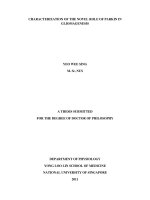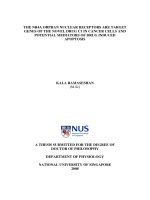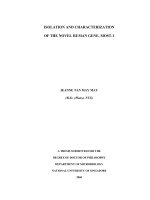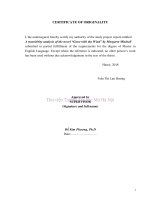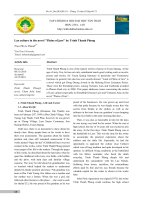the novel mauprat
Bạn đang xem bản rút gọn của tài liệu. Xem và tải ngay bản đầy đủ của tài liệu tại đây (1.29 MB, 288 trang )
TheProjectGutenbergEBookofMauprat,byGeorgeSand
ThiseBookisfortheuseofanyoneanywhereatnocostandwith
almostnorestrictionswhatsoever.Youmaycopyit,giveitawayor
re-useitunderthetermsoftheProjectGutenbergLicenseincluded
withthiseBookoronlineatwww.gutenberg.org
Title:Mauprat
Author:GeorgeSand
Translator:StanleyYoung
ReleaseDate:March25,2006[EBook#2194]
LastUpdated:November19,2016
Language:English
***STARTOFTHISPROJECTGUTENBERGEBOOKMAUPRAT***
ProducedbyDagny;JohnBickersandDavidWidger
MAUPRAT
byGeorgeSand
TranslatedbyStanleyYoung
CONTENTS
GEORGESAND
LIFEOFGEORGESAND
PREFACE
MAUPRAT
I
II
III
IV
V
VI
VII
VIII
IX
X
XI
XII
XIII
XIV
XV
XVI
XVII
XVIII
XIX
XX
XXI
XXII
XXIII
XXIV
XXV
XXVI
XXVII
XXVIII
XXIX
XXX
GEORGESAND
Napoleoninexiledeclaredthatwereheagainonthethroneheshouldmakea
point of spending two hours a day in conversation with women, from whom
therewasmuchtobelearnt.Hehad,nodoubt,severaltypesofwomeninmind,
butitismorethanprobablethatthebanishmentofMadamedeStaelrosebefore
him as one of the mistakes in his career. It was not that he showed lack of
judgmentmerelybythepersecutionofararetalent,butbyfailingtoseethatthe
raretalentwaspointingouttruthsveryvaluabletohisownsafety.Thisiswhat
happened in France when George Sand—the greatest woman writer the world
has known, or is ever likely to know—was attacked by the orthodox critics of
her time. They feared her warnings; they detested her sincerity—a sincerity
displayed as much in her life as in her works (the hypocrite’s Paradise was
preciselyherideaofHell);theyresentedbitterlyanindependenceofspiritwhich
inamanwouldhavebeeninthehighestdegreedistinguished,whichremained,
under every test, untamable. With a kind of bonhomie which one can only
compare with Fielding’s, with a passion as great as Montaigne’s for
acknowledging the truths of experience, with an absence of self-consciousness
trulyamazingintheartistictemperamentofeithersex,shewroteexactlyasshe
thought,sawandfelt.Humourwasnotherstrongpoint.Shehadanexultantjoy
inliving,butlaughter,whethergenialorsardonic,isnotinherwork.Ironyshe
seldom,ifever,employed;satiresheneverattempted.Itwasonthematernal,the
sympatheticsidethatherfemininity,andthereforehercreativegenius,wasmost
strongly developed. She was masculine only in the deliberate libertinism of
certainepisodesinherownlife.Thiswasacharacteristic—oneonnoaccountto
beoverlookedordeniedordisguised,butitwasnothercharacter.Thecharacter
was womanly, tender, exquisitely patient and good-natured. She would take
crosshumanityinherarms,andcarryitoutintothesunshineofthefields;she
wouldshowitflowersandbirds,singsongstoit,tellitstories,recallitsoriginal
beauty.Eveninhermoodsofdepressionandrevolt,onerecognisesthefatigueof
thestrong.Itisneverforamomentthelassitudeofthefeeble,thewearyspiteof
asickandill-usedsoul.Asshewasfreefrompersonalvanity,shewasalsofree
fromhysteria.Onmarriage—theonesubjectwhichdrovehertoacertainthough
always disciplined violence—she clearly felt more for others than they felt for
themselves;andinobservingcertainhouseholdsandlifepartnerships,shemay
havebeenafflictedwithadismaywhichtheunreflectingsufferersdidnotshare.
Nowriterwhowascarriedawaybyegoisticangerordisappointmentcouldhave
told these stories of unhappiness, infidelity, and luckless love with such
dispassionatelucidity.
With the artist’s dislike of all that is positive and arbitrary, she was,
nevertheless, subject rather to her intellect than her emotions. An insult to her
intelligencewastheonethingshefoundithardtopardon,andsheallowedno
externalinterferencetodisturbherrelationswithherownreasoningfaculty.She
followed caprices, no doubt, but she was never under any apprehension with
regard to their true nature, displaying in this respect a detachment which is
usually considered exclusively virile. Elle et Lui, which, perhaps because it is
shortandassociatedwithactualfacts,isthemostfrequentlydiscussedingeneral
conversationonherwork,remainsprobablythesanestaccountofasentimental
experimentwhichwaseverwritten.HowfaritmayhaveseemedaccuratetoDe
Musset is not to the point. Her version of her grievance is at least convincing.
Withoutfearandwithouthope,shemakesherstatement,anditstands,therefore,
unique of its kind among indictments. It has been said that her fault was an
excessofemotionalism;thatistosay,sheattachedtoomuchimportancetomere
feeling anddescribedit, in Frenchofmarvellouseaseand beauty,with agood
deal of something else which one can almost condemn as the high-flown. Not
that the high-flown is of necessity unnatural, but it is misleading; it places the
passing mood, the lyrical note, dependent on so many accidents, above the
essentialtemperamentandthedominantchordwhichdependonlifeonly.Where
shefallsshortoftheverygreatestmastersisinthisallbutdeliberateconfusion
of things which must change or can be changed with things which are
unchangeable, incurable, and permanent. Shakespeare, it is true, makes all his
villains talk poetry, but it is the poetry which a villain, were he a poet, would
inevitably write. George Sand glorifies every mind with her own peculiar fire
andtears.Thefireis,fortunately,somuchstrongerthanthetearsthatherpassion
neverdegeneratesintothemaudlin.Allthesame,shemakestoouniversalause
of her own strongest gifts, and this is why she cannot be said to excel as a
portrait painter. One merit, however, is certain: if her earliest writings were
dangerous, it was because of her wonderful power of idealization, not because
shefilledherpageswiththerevoltingandepicenesensualityofthenewItalian,
French,andEnglishschools.Intellectualviciousnesswasnotherfailing,andshe
nevermadethemodernmistakeofconfusingindecencywithvigour.Sheloved
nature, air, and light too well and too truly to go very far wrong in her
imaginations.Itmayindeedbeimpossibleformanyofustoacceptallhersocial
and political views; they have no bearing, fortunately, on the quality of her
literaryart;theyhavetobeconsideredunderadifferentaspect.Inpolitics,her
judgment, as displayed in the letters to Mazzini, was profound. Her
correspondence with Flaubert shows us a capacity for stanch, unblemished
friendship unequalled, probably, in the biographies, whether published or
unpublished,oftheremarkable.
Withregardtoherimpiety—forsuchitshouldbecalled—itdidnotarisefrom
arrogance,norwasitbasedinanywayuponthehigherlearningofherperiod.
Simply she did not possess the religious instinct. She understood it
sympathetically—inSpiridion,forinstance,shedescribesanasceticnatureasit
has never been done in any other work of fiction. Newman himself has not
written passages of deeper or purer mysticism, of more sincere spirituality.
Balzac,inSeraphita,attemptedsomethingofthekind,buttheresultwasnever
morethanatourdeforce.Hecouldinvent,hecoulddescribe,butGeorgeSand
felt;andasshefelt,shecomposed,livingwithandlovingwithanunderstanding
loveallhercreations.Butithastoberememberedalwaysthatsherepudiatedall
religiousrestraint,thatshebelievedinthehumanheart,thatsheacknowledged
nohigherlawthanitsownimpulses,thatshesawlovewhereothersseeonlya
cruel struggle for existence, that she found beauty where ordinary visions can
detect little besides a selfishness worse than brutal and a squalor more pitiful
thandeath.Everywheresheinsistsuponthepurifyinginfluenceofaffection,no
matterhowdegradedinitscircumstancesorhowillegalinitsmanifestation.No
writer—not excepting the Brontes—has shown a deeper sympathy with
uncommon temperaments, misunderstood aims, consciences with flickering
lights, the discontented, the abnormal, or the unhappy. The great modern
specialist for nervous diseases has not improved on her analysis of the
neuropathic and hysterical. There is scarcely a novel of hers in which some
character does not appear who is, in the usual phrase, out of the common run.
Yet, with this perfect understanding of the exceptional case, she never permits
anyscienceofcauseandeffecttoobscuretherulesandprincipleswhichinthe
maincontrollifeforthemajority.Itwas,nodoubt,thisbalancewhichmadeher
a popular writer, even while she never ceased to keep in touch with the most
acutemindsofFrance.
Shepossessed,inadditiontocreativegeniusofanorderespeciallyindividual
and charming, a capacity for the invention of ideas. There are in many of her
chaptersmoreideas,moresuggestionsthanonewouldfindinawholevolumeof
Flaubert. It is not possible that these surprising, admirable, and usually sound
thoughtsweretheresultoflonghoursofreflection.Theybelongedtohernature
and a quality of judgment which, even in her most extravagant romances, is
never for a moment swayed from that sane impartiality described by the
unobservantascommonsense.
Herfairnesstowomenwasnottheleastastoundingofhergifts.Sheiskindto
thebeautiful,theyielding,abovealltotheveryyoung,andinnoneofherstories
hassheintroducedanyviolentlydisagreeablefemalecharacters.Hervillainsare
mostlymen,andeventhesesheinvestswithapicturesquefatalitywhichdrives
them to errors, crimes, and scoundrelism with a certain plaintive, if relentless,
grace. The inconstant lover is invariably pursued by the furies of remorse; the
brutal has always some mitigating influence in his career; the libertine retains
throughmanyvicissitudesaseraphicloveforsomefaithfulSolveig.
Humanity meant far more to her than art: she began her literary career by
describingfactsassheknewthem:criticsdrovehertoexaminetheircauses,and
so she gradually changed from the chronicler with strong sympathies to the
interpreter with a reasoned philosophy. She discovered that a great deal of the
sufferinginthisworldisduenotsomuchtooriginalsin,buttoakindoforiginal
stupidity, an unimaginative, stubborn stupidity. People were dishonest because
they believed, wrongly, that dishonesty was somehow successful. They were
cruel because they supposed that repulsive exhibitions of power inspired a
prolonged fear. They were treacherous because they had never been taught the
greaterstrengthofcandour.GeorgeSandtriedtopointouttheadvantageofplain
dealing, and the natural goodness of mankind when uncorrupted by a false
education. She loved the wayward and the desolate: pretentiousness in any
disguise was the one thing she suspected and could not tolerate. It may be
questioned whether she ever deceived herself; but it must be said, that on the
whole she flattered weakness—and excused, by enchanting eloquence, much
whichcannotalwaysbejustifiedmerelyonthegroundthatitisexplicable.But
to explain was something—all but everything at the time of her appearance in
literature. Every novel she wrote made for charity—for a better acquaintance
withourneighbour’swoesandourownegoism.Suchanattitudeofmindisonly
possibletoanabsolutelyfrank,evenArcadian,nature.Shedidwhatshewished
to do: she said what she had to say, not because she wanted to provoke
excitementorastonishthemultitude,butbecauseshehadsucceededeminently
in leading her own life according to her own lights. The terror of appearing
inconsistentexcitedherscorn.Appearancesnevertroubledthatunashamedsoul.
Thisisthemagic,thepeculiarfascinationofherbooks.Wefindourselvesinthe
presenceofafreshness,aprimevalvigourwhichproducesactuallytheeffectof
seeingnewscenes,offacingafreshclimate.Herloveofthesoil,offlowers,and
the sky, for whatever was young and unspoilt, seems to animate every page—
even in her passages of rhetorical sentiment we never suspect the burning
pastille,thegauzetea-gown,orthedepressedpinklight.Rhetoricitmaybe,but
itistherhetoricoftheseaandthewheatfield.Itcanbespokenintheopenair
andreadbythelightofday.
George Sand never confined herself to any especial manner in her literary
work. Her spontaneity of feeling and the actual fecundity, as it were, of her
imaginativegift,couldnotberestrained,concentrated,andformallyarrangedas
itwasinthecaseofthetwofirstmastersofmodernFrenchnovel-writing.Her
workinthisrespectmaybecomparedtoagoldmine,whiletheirsisratherthe
goldsmith’s craft. It must not be supposed, however, that she was a writer
without very strong views with regard to the construction of a plot and the
developmentofcharacter.Herliteraryessaysandreviewsshowaknowledgeof
techniquewhichcouldbeacceptedatanytimeasatext-bookforthecriticsand
thecriticised.Sheknewexactlyhowartisticeffectswereobtained,howandwhy
certain things were done, why realism, so-called, could never be anything but
caricature, and why over-elaboration of small matters can never be otherwise
thandisproportionate.NothingcouldbemorejustthanhersayingaboutBalzac
thathewassuchalogicianthatheinventedthingsmoretruthfulthanthetruth
itself.Nooneknewbetterthanshethatthetruth,asitiscommonlyunderstood,
doesnotexist;thatitcannotbelogicalbecauseofitsmystery;andthatitisthe
knowledgeofitscontradictionswhichshowstherealexpertinpsychology.
Threeofherstories—LaPetiteFadette,LaMareauDiable,andLesMaitres
Mosaistes—areasneatintheirworkmanshipasaDutchpainting.Herbrilliant
powers of analysis, the intellectual atmosphere with which she surrounds the
morecomplexcharactersinherlongerromances,areentirelyputaside,andwe
aregiveninsteadaseriesofpicturesanddialoguesinwhathasbeencalledthe
purelyobjectivestyle;sopureinitsobjectivityanddetachmentthatitwouldbe
hard for any one to decide from internal evidence that they were in reality her
owncomposition.
Tothosewhoseekforproportionandformthereis,withoutdoubt,muchthat
isunsymmetricalinherdesigns.Interestingshealwaysis,buttothetrainedeye
scenes of minor importance are, strictly speaking, too long: descriptions in
musical language sometimes distract the reader from the progress of the story.
Butthisarosefromherownjoyinwriting:muchasshevaluedproportion,she
likedexpressinghermindbetter,notoutofconceitorself-importance,butasthe
birds,whomshelovedsowell,sing.
GoodnatureiswhatweneedaboveallinreadingGeorgeSand.Itisthere—
infectious enough in her own pages, and with it the courage which can come
onlyfromaheartatpeacewithitself.Thisiswhyneitherfashionnornewnor
oldcriticismcanaffectthetitleofGeorgeSandamongthegreatestinfluencesof
thelastcenturyandthepresentone.Muchthatshehassaidstillseemsuntried
andunexpected.WriterssooppositeasIbsenandAnatoleFrancehaveexpanded
herthemes.Sheisquotedunconsciouslyto-daybyhundredswhoareignorantof
their real source of inspiration. No woman ever wrote with such force before,
andnowomansincehasevenapproachedhersupremeaccomplishments.
PEARLMARY-TERESACRAIGIE.
LIFEOFGEORGESAND
GeorgeSand,inwhoselifenothingwascommonplace,wasborninParis,“in
the midst of roses, to the sound of music,” at a dance which her mother had
somewhat rashly attended, on the 5th of July, 1804. Her maiden name was
ArmentineLucileAuroreDupin,andherancestrywasofaromanticcharacter.
Shewas,infact,ofroyalblood,beingthegreat-grand-daughteroftheMarshal
Maurice du Saxe and a Mlle. Verriere; her grandfather was M. Dupin de
Francueil, the charming friend of Rousseau and Mme. d’Epinay; her father,
MauriceDupin,wasagayandbrilliantsoldier,whomarriedtheprettydaughter
ofabird-fancier,anddiedearly.Shewasachildofthepeopleonhermother’s
side,anaristocratonherfather’s.In1807shewastakenbyherfather,whowas
on Murat’s staff, into Spain, from which she returned to the house of her
grandmother,atNohant inBerry.ThisoldladyadoptedAuroreatthedeathof
herfather,in1808.OfherchildhoodGeorgeSandhasgivenamostpicturesque
accountinher“HistoiredemaVie.”In1817thegirlwassenttotheConventof
theEnglishAugustiniansinParis,whereshepassedthroughastateofreligious
mysticism.ShereturnedtoNohantin1820,andsoonthrewoffherpietisminthe
outdoor exercises of a wholesome country life. Within a few months, Mme.
Dupin de Francueil died at a great age, and Aurore was tempted to return to
Paris.Herrelatives,however,wereanxiousthatsheshouldnotdothis,andthey
introduced to her the natural son of a retired colonel, the Baron Dudevant,
whom, in September, 1822, she married. She brought him to live with her at
Nohant,andsheborehimtwosons,MauriceandSolange,andadaughter.She
quickly perceived, as her own intellectual nature developed, that her boorish
husband was unsuited to her, but their early years of married life were not
absolutelyintolerable.In1831,however,shecouldendurehimnolonger,andan
amicableseparationwasagreedupon.SheleftM.DudevantatNohant,resigning
herfortune,andproceededtoParis,whereshewashardpressedtofindaliving.
Sheendeavoured,withoutsuccess,topaintthelidsofcigar-boxes,andinfinal
desperation,undertheinfluenceofJulesSandeau—whobecameherlover,and
whoinventedthepseudonymofGeorgeSandforher—sheturnedherattention
to literature. Her earliest work was to help Sandeau in the composition of his
novel,“RoseetBlanche”Herfirstindependentnovel,“Indiana,”appearedatthe
close of 1831, and her second, “Valentine,” two months later. These books
produced a great and immediate sensation, and she felt that she had found her
vocation. In 1833 she produced “Lebia”; in 1834 the “Lettres d’un Voyageur”
and “Jacques”; in 1835 “Andre” and “Leone Leoni.” After this her works
becometoonumerousandwereproducedwithtoomonotonousaregularitytobe
chronicled here. But it should be said that “Mauprat” was written in 1836 at
Nohant,whileshewaspleadingforalegalseparationfromherhusband,which
wasgivenherbythetribunalofBourges,withfullauthorityovertheeducation
ofherchildren.Theseearlynovelsallreflectinmeasurethepersonalsorrowsof
the author, although George Sand never ceased to protest against too strict a
biographical interpretation of their incidents. “Spiridion” (1839), composed
under the influence of Lamennais, deals with questions of free thought in
religion.Butthenovelsofthefirstperiodofherliteraryactivity,whichcameto
a close in 1840, are mainly occupied with a lyrical individualism, and are
inspiredbythewrongsanddisillusionsoftheauthor’spersonaladventures.
The years 1833 and 1834 were marked by her too-celebrated relations with
AlfreddeMusset,withwhomshelivedinParisandatVenice,andwithwhom
she quarrelled at last in circumstances deplorably infelicitous. Neither of these
greatcreatureshadthereticencetoexcludetheworldfromanarrativeoftheir
misfortunes and adventures; of the two it was fairly certainly the woman who
camethelessinjuredoutofthefurnace.In“ElleetLui”(1859)shegavelong
afterwardherversionoftheunhappyandundignifiedstory.HerstayinVenice
appearstohaveimpressedhergeniusmoredeeplythananyothersectionofher
numerousforeignsojournings.
The writingsofGeorge Sand’ssecond period,whichextendedfrom1840to
1848, are of a more general character, and are tinged with a generous but not
veryenlightenedardourforsocialemancipation.Ofthesenovels,theearliestis
“LeCompagnonduTourdeFrance”(1840),whichisscarcelyamasterpiece.In
thepursuitofforeignmodesofthought,andimpelledbyexperiencesoftravel,
George Sand rose to far greater heights in “Jeanne” (1842), in “Consuelo”
(1842-’43), andin“LaComtesse de Rudolstade”(1844). Allthesebookswere
composedinherretirementatNohant,whereshedefinitelysettledin1839,after
having travelled for several months in Switzerland with Liszt and Mme.
d’Agoult,andhavinglivedintheislandofMajorcaforsometimewiththedying
Chopin,anepisodewhichisenshrinedinher“LucreziaFloriani”(1847).
TheRevolutionof1848appearedtoGeorgeSandarealizationofherUtopian
dreams, and plunged her thoughts into a painful disorder. She soon, however,
becamedissatisfiedwiththeresultofherrepublicantheories,andsheturnedto
two new sources of success, the country story and the stage. Her delicious
romance of “Francois le Champi” (1850) attracted a new and enthusiastic
audiencetoher,andherentireemancipationfrom“problems”wasmarkedinthe
pages of “La Petite Fadette” and of “La Mare au Diable.” To the same period
belong “Les Visions de la Nuit des les Campagnes,” “Les Maitres Sonneurs,”
and “Cosina.” From 1850 to 1864 she gave a great deal of attention to the
theatre, and of her numerous pieces several enjoyed a wide and considerable
success, although it cannot be said that any of her plays have possessed the
vitalityofherbestnovels.Themostsolidoftheformerwasherdramatizationof
her story, “Le Marquis de Villemer” (1864), which was one of the latest, and
nexttoit“LeMariagedeVictorine”(1851),whichwasoneoftheearliest.Her
successesonthestage,suchastheyare,appearmainlyduetocollaborationwith
others.
In her latest period, from 1860 to 1876, George Sand returned to her first
lyricalmanner,althoughwithmorereticenceandawiderexperienceoflife.Of
the very abundant fruitage of these last years, not many rank with the
masterpieces of her earlier periods, although such novels as “Tamaris” (1862),
“LaConfessiond’uneJeuneFille”(1865),and“Cadio,”seemedtoheradmirers
to show no decline of force or fire. Still finer, perhaps, were “Le Marquis de
Villemer” (1861) and “Jean de la Roche” (1860). Her latest production, which
appearedafterherdeath,wasthe“Contesd’uneGrand’mere,”acollectionfull
ofhumanityandbeauty.GeorgeSanddiedatNohantonthe8thofJune,1876.
She had great qualities of soul, and in spite of the naive irregularities of her
conduct in early middle life, she cannot be regarded otherwise than as an
excellent woman. She was brave, courageous, heroically industrious, a loyal
friend,atenderandwisemother.Herprinciplefaulthasbeenwittilydefinedby
Mr. Henry James, who has remarked that in affairs of the heart George Sand
never“behavedlikeagentleman.”
E.G.
PREFACE
WhenIwrotemynovelMaupratatNohant—in1846,ifIrememberrightly—
I had just been suing for a separation. Hitherto I had written much against the
abusesofmarriage,andperhaps,thoughinsufficientlyexplainingmyviews,had
inducedabeliefthatIfailedtoappreciateitsessence;butitwasatthistimethat
marriageitselfstoodbeforemeinallthemoralbeautyofitsprinciple.
Misfortuneisnotwithoutitsusestothethoughtfulmind.ThemoreclearlyI
had realized the pain and pity of having to break a sacred bond, the more
profoundly I felt that where marriage is wanting, is in certain elements of
happinessandjusticeoftooloftyanaturetoappealtoouractualsociety.Nay,
more;societystrivestotakefromthesanctityoftheinstitutionbytreatingitasa
contractofmaterialinterests,attackingitonallsidesatonce,bythespiritofits
manners,byitsprejudices,byitshypocriticalincredulity.
While writing a novel as an occupation and distraction for my mind, I
conceivedtheideaofportrayinganexclusiveandundyinglove,before,during,
andaftermarriage.ThusIdrewtheheroofmybookproclaiming,attheageof
eighty,hisfidelitytotheonewomanhehadeverloved.
Theidealofloveisassuredlyeternalfidelity.Moralandreligiouslawshave
aimed at consecrating this ideal. Material facts obscure it. Civil laws are so
framed as to make it impossible or illusory. Here, however, is not the place to
provethis.NorhasMaupratbeenburdenedwithaproofofthetheory;only,the
sentiment by which I was specially penetrated at the time of writing it is
embodied inthe wordsof Mauprattowardstheendofthebook:“Shewas the
only woman I loved in all my life; none other ever won a glance from me, or
knewthepressureofmyhand.”
GEORGESAND.
June5,1857.
TOGUSTAVEPAPET
Thoughfashionmayproscribethepatriarchalfashionofdedications,Iwould
ask you, brother and friend, to accept this of a tale which is not new to you. I
havedrawnmymaterialsinpartfromthecottagesofourNoirevalley.Maywe
liveanddiethere,repeatingeveryeveningourbelovedinvocation:
SANCTASIMPLICITAS!GEORGESAND.
MAUPRAT
On the borders of La Marche and Berry, in the district known as Varenne,
whichisnaughtbutavastmoorstuddedwithforestsofoakandchestnut,andin
the most thickly wooded and wildest part of the country, may be found,
crouchingwithinaravine,alittleruinedchateau.Thedilapidatedturretswould
not catch your eye until you were about a hundred yards from the principal
portcullis.Thevenerabletreesaroundandthescatteredrocksabove,buryitin
everlastingobscurity;andyouwouldexperiencethegreatestdifficulty,evenin
broad daylight, in crossing the deserted path leading to it, without stumbling
against the gnarled trunks and rubbish that bar every step. The name given to
thisdarkravineandgloomycastleisRoche-Mauprat.
ItwasnotsolongagothatthelastoftheMauprats,theheirtothisproperty,
hadtheroofingtakenawayandallthewoodworksold.Then,asiftogiveakick
tothememoryofhisancestors,heorderedtheentrancegatetobethrowndown,
thenorthtowertobegutted,andabreachtobemadeinthesurroundingwall.
Thisdone,hedepartedwithhisworkmen,shakingthedustfromoffhisfeet,and
abandoning his domain to foxes, and cormorants, and vipers. Since then,
whenever the wood-cutters and charcoal-burners from the huts in the
neighbourhood pass along the top of the Roche-Mauprat ravine, if it is in
daytime they whistle with a defiant air or hurl a hearty curse at the ruins; but
when day falls and the goat-sucker begins to screech from the top of the
loopholes, wood-cutter and charcoal-burner pass by silently, with quickened
step,andcrossthemselvesfromtimetotimetowardofftheevilspiritsthathold
swayamongtheruins.
Formyself,IownthatIhaveneverskirtedtheravineatnightwithoutfeeling
acertainuneasiness;andIwouldnotliketoswearthatonsomestormynightsI
havenotgivenmyhorseatouchofthespur,inordertoescapethemorequickly
fromthedisagreeableimpressionthisneighbourhoodmadeonme.
ThereasonisthatinchildhoodIclassedthenameofMaupratwiththoseof
Cartouche and Bluebeard; and in the course of horrible dreams I often used to
mix up the ancient legends of the Ogre and the Bogey with the quite recent
events which in our province had given such a sinister lustre to this Mauprat
family.
Frequently,outshooting,whenmycompanionsandIhaveleftourpoststogo
andwarmourselvesatthecharcoalfireswhichtheworkmenkeepupallnight,I
haveheardthisnamedyingawayontheirlipsatourapproach.Butwhenthey
hadrecognisedusandthoroughlysatisfiedthemselvesthattheghostsofnoneof
these robbers were hiding in our midst, they would tell us in a whisper such
stories as might make one’s hair stand on end, stories which I shall take good
carenottopassontoyou,grievedasIamthattheyshouldeverhavedarkened
andpainedmyownmemory.
NotthatthestoryIamabouttotellisaltogetherpleasantandcheerful.Onthe
contrary, I must ask your pardon for unfolding so sombre a tale. Yet, in the
impressionwhichithasmadeonmyselfthereissomethingsoconsolingand,ifI
mayventurethephrase,sohealthfultothesoul,thatyouwillexcuseme,Ihope,
forthesakeoftheresult.Besidesthisisastorywhichhasjustbeentoldtome.
Andnowyouaskmeforone.Theopportunityistoogoodtobemissedforone
ofmylazinessorlackofinvention.
ItwasonlylastweekthatImetBernardMauprat,thelastoftheline,theman
who, having long before severed himself from his infamous connections,
determinedtodemolishhismanorasasignofthehorrorarousedinhimbythe
recollectionsofchildhood.ThisBernardisoneofthemostrespectedmeninthe
province.HelivesinaprettyhousenearChateauroux,inaflatcountry.Finding
myselfintheneighbourhood,withafriendofminewhoknowshim,Iexpressed
a wish to be introduced; and my friend, promising me a hearty welcome, took
metohishousethenandthere.
I already knew in outline the remarkable history of this old man; but I had
alwaysfeltakeendesiretofillinthedetails,andabovealltoreceivethemfrom
himself.Forme,thestrangedestinyofthemanwasaphilosophicalproblemto
be solved. I therefore noticed his features, his manners, and his home with
peculiarinterest.
Bernard Mauprat must be fully eighty-four, though his robust health, his
upright figure, his firm step, and the absence of any infirmity might indicate
somefifteenortwentyyearsless.Hisfacewouldhaveappearedtomeextremely
handsome,hadnotacertainharshnessofexpressionbroughtbeforemyeyes,in
spiteofmyself,theshadesofhisfathers.Iverymuchfearthat,externallyatall
events,hemustresemblethem.Thishealonecouldhavetoldus;forneithermy
friend nor myself had known any other Mauprat. Naturally, however, we were
verycarefulnottoinquire.
Itstruckusthathisservantswaitedonhimwithapromptitudeandpunctuality
quitemarvellousinBerrichondomestics.Nevertheless,attheleastsemblanceof
delay he raised his voice, knitted his eyebrows (which still showed very black
underhiswhitehair),andmutteredafewexpressionsofimpatiencewhichlent
wings even to the slowest. At first I was somewhat shocked at this habit; it
appeared to savour rather too strongly of the Mauprats. But the kindly and
almostpaternalmannerinwhichhespoketothemamomentlater,andtheirzeal,
which seemed so distinct from fear, soon reconciled me to him. Towards us,
moreover, he showed an exquisite politeness, and expressed himself in the
choicest terms.Unfortunately,attheendofdinner,adoorwhichhadbeenleft
open and through which a cold air found its way to his venerable skull, drew
fromhimsuchafrightfuloaththatmyfriendandIexchangedalookofsurprise.
Henoticedit.
“I beg your pardon, gentlemen,” he said. “I am afraid you find me an odd
mixture.Ah,youseebutashortdistance.Iamanoldbranch,happilytornfrom
aviletrunkandtransplantedintogoodsoil,butstillknottedandroughlikethe
wild holly of the original stock. I have, believe me, had no little trouble in
reachingthestateofcomparativegentlenessandcalminwhichyoubeholdme.
Alas! if I dared, I should reproach Providence with a great injustice—that of
havingallottedmealifeasshortasothermen’s.Whenonehastostrugglefor
fortyorfiftyyearstotransformone’sselffromawolfintoaman,oneoughtto
liveahundredyearslongertoenjoyone’svictory.Yetwhatgoodwouldthatdo
me?”headdedinatoneofsadness.“Thekindfairywhotransformedmeishere
nomoretotakepleasureinherwork.Bah!itisquitetimetohavedonewithit
all.”
Then he turned towards me, and, looking at me with big dark eyes, still
strangelyanimated,said:
“Come, my dear young man; I know what brings you to see me; you are
curious to hear my history. Draw nearer the fire, then. Mauprat though I am, I
willnotmakeyoudodutyforalog.Inlisteningyouaregivingmethegreatest
pleasure you could give. Your friend will tell you, however, that I do not
willinglytalkofmyself.Iamgenerallyafraidofhavingtodealwithblockheads,
butyouIhavealreadyheardof;Iknowyourcharacterandyourprofession;you
are an observer and narrator—in other words, pardon me, inquisitive and a
chatterbox.”
He began to laugh, and I made an effort to laugh too, though with a rising
suspicionthathewasmakinggameofus.NorcouldIhelpthinkingofthenasty
tricksthathisgrandfathertookadelightinplayingontheimprudentbusybodies
who called upon him. But he put his arm through mine in a friendly way, and
makingmesitdowninfrontofagoodfire,nearatablecoveredwithcups—
“Don’t be annoyed,” he said. “At my age I cannot get rid of hereditary
sarcasm;butthereisnothingspitefulinmine.Tospeakseriously,Iamdelighted
toseeyouandtoconfideinyouthestoryofmylife.AmanasunfortunateasI
have been deserves to find a faithful biographer to clear his memory from all
stain.Listen,then,andtakesomecoffee.”
I offered him a cup in silence. He refused it with a wave of the arm and a
smilewhichseemedtosay,“Thatisratherforyoureffeminategeneration.”
Thenhebeganhisnarrativeinthesewords:
I
YoulivenotveryfarfromRoche-Mauprat,andmusthaveoftenpassedbythe
ruins.Thusthereisnoneedformetodescribethem.AllIcantellyouisthatthe
place has never been so attractive as it is now. On the day that I had the roof
takenoff,thesunforthefirsttimebrightenedthedampwallswithinwhichmy
childhoodwaspassed;andthelizardstowhichIhaveleftthemaremuchbetter
housedtherethanIoncewas.Theycanatleastbeholdthelightofdayandwarm
theircoldlimbsintheraysofthesunatnoon.
ThereusedtobeanelderandayoungerbranchoftheMauprats.Ibelongto
theelder.MygrandfatherwasthatoldTristandeMaupratwhoranthroughhis
fortune, dishonoured his name, and was such a blackguard that his memory is
alreadysurroundedbyahaloofthemarvelous.Thepeasantsstillbelievethathis
ghostappears,eitherinthebodyofawizardwhoshowsmalefactorsthewayto
thedwellingsofVarenne,orinthatofanoldwhiteharewhichrevealsitselfto
peoplemeditatingsomeevildeed.WhenIcameintotheworldtheonlyliving
memberoftheyoungerbranchwasMonsieurHubertdeMauprat,knownasthe
chevalier,becausehebelongedtotheOrderoftheKnightsofMalta;amanjust
as good as his cousin was bad. Being the youngest son of his family, he had
taken the vow of celibacy; but, when he found himself the sole survivor of
severalbrothersand sisters,heobtainedreleasefromhisvow,andtookawife
the year before I was born. Rumour says that before changing his existence in
thiswayhemadestrenuouseffortstofindsomedescendantoftheelderbranch
worthytorestorethetarnishedfamilyname,andpreservethefortunewhichhad
accumulatedinthehandsoftheyoungerbranch.Hehadendeavouredtoputhis
cousinTristan’saffairsinorder,andhadfrequentlypaidoffthelatter’screditors.
Seeing,however,thattheonlyeffectofhiskindnesswastoencouragethevices
ofthefamily,andthat,insteadofrespectandgratitude,hereceivednothingbut
secret hatred and churlish jealousy, he abandoned all attempts at friendship,
brokewithhiscousins,andinspiteofhisadvancedage(hewasoversixty),took
a wife in order to have heirs of his own. He had one daughter, and there his
hopes of posterity ended; for soon afterward his wife died of a violent illness
whichthedoctorscallediliacpassion.Hethenleftthatpartofthecountryand
returned but rarely to his estates. These were situated about six leagues from
Roche-Mauprat,onthebordersoftheVarenneduFromental.Hewasaprudent
manandajust,becausehewascultured,becausehisfatherhadmovedwiththe
spiritofhiscentury,andhadhadhimeducated.Nonethelesshehadpreserveda
firmcharacterandanenterprisingmind,and,likehisancestors,hewasproudof
hearingasasortofsurnametheknightlytitleofHeadbreaker,hereditaryinthe
original Mauprat stock. As for the elder branch, it had turned out so badly, or
ratherhadpreservedfromtheoldfeudaldayssuchterriblehabitsofbrigandage,
that it had won for itself the distinctive title of Hamstringer. [I hazard
“Headbreaker”and“Hamstringer”aspoorequivalentsforthe“Casse-Tete”and
“Coupe-Jarret” of the French.—TR.] Of the sons of Tristan, my father, the
eldest,wastheonlyonewhomarried.Iwashisonlychild.Hereitisnecessary
tomentionafactofwhichIwaslongignorant.HubertdeMauprat,onhearingof
mybirth,beggedmeofmyparents,undertakingtomakemehisheirifhewere
allowedabsolutecontrolovermyeducation.Atashooting-partyaboutthistime
my father was killed by an accidental shot, and my grandfather refused the
chevalier’soffer,declaringthathischildrenwerethesolelegitimateheirsofthe
younger branch, and that consequently he would resist with all his might any
substitution in my favour. It was then that Hubert’s daughter was born. But
when,sevenyearslater,hiswifediedleavinghimthisonechild,thedesire,so
stronginthenoblesofthattime,toperpetuatetheirname,urgedhimtorenew
hisrequesttomymother.WhatheranswerwasIdonotknow;shefellilland
died. The country doctors again brought in a verdict of iliac passion. My
grandfatherhadspentthelasttwodaysshepassedinthisworldwithher.
PourmeoutaglassofSpanishwine;forIfeelacoldshiverrunningthrough
my body. It is nothing serious—merely the effect that these early recollections
haveonmewhenIbegintonarratethem.Itwillsoonpassoff.
Heswallowedalargeglassofwine,andwedidthesame;forasensationof
cold came upon us too as we gazed at his stern face and listened to his brief,
abruptsentences.Hecontinued:
ThusattheageofsevenIfoundmyselfanorphan.Mygrandfathersearched
mymother’shouseandseizedallthemoneyandvaluableshecouldcarryaway.
Then,leavingtherest,anddeclaringhewouldhavenothingtodowithlawyers,
hedidnotevenwaitforthefuneral,buttookmebythecollarandflungmeonto
the crupper of his horse, saying: “Now, my young ward, come home with me;
andtrytostopthatcryingsoon,forIhaven’tmuchpatiencewithbrats.”Infact,
after a few seconds he gave me such hard cuts with his whip that I stopped
crying, and, withdrawing myself like a tortoise into my shell, completed the
journeywithoutdaringtobreathe.
Hewasatalloldman,bonyandcross-eyed.IfancyIseehimnowashewas
then. The impression that evening made on me can never be effaced. It was a
suddenrealizationofallthehorrorswhichmymotherhadforeshadowedwhen
speaking of her execrable father-in-law and his brigands of sons. The moon, I
remember, was shining here and there through the dense foliage of the forest.
My grandfather’s horse was lean, hardy, and bad-tempered like himself. It
kickedateverycutofthewhip,anditsmastergaveitplenty.Swiftasanarrowit
jumpedtheravinesandlittletorrentswhicheverywhereintersectVarenneinall
directions.AteachjumpIlostmybalance,andclunginterrortothesaddleor
mygrandfather’scoat.Asforhim,hewassolittleconcernedaboutmethat,had
I fallen, I doubt whether he would have taken the trouble to pick me up.
Sometimes,noticingmyterror,hewouldjeeratme,and,tomakemestillmore
afraid,sethishorseplungingagain.Twentytimes,inafrenzyofdespair,Iwas
onthepointofthrowingmyselfoff;buttheinstinctiveloveoflifepreventedme
from giving way to the impulse. At last, about midnight, we suddenly stopped
beforeasmallpointedgate,andthedrawbridgewassoonliftedbehindus.My
grandfather took me, bathed in a cold sweat as I was, and threw me over to a
greatfellow,lameandhorriblyugly,whocarriedmeintothehouse.Thiswasmy
UncleJohn,andIwasatRoche-Mauprat.
Atthattimemygrandfather,alongwithhiseightsons,formedthelastrelicin
our province of that race of petty feudal tyrants by which France had been
overrun and harassed for so many centuries. Civilization, already advancing
rapidlytowardsthegreatconvulsionoftheRevolution,wasgraduallystamping
outthesystematicextortionsoftheserobbers.Thelightofeducation,aspecies
of good taste reflected, however dimly, from a polished court, and perhaps a
presentimentoftheimpendingterribleawakeningofthepeople,werespreading
throughthecastlesandeventhroughthehalf-rusticmanorsofthelordlings.Ever
in our midland provinces, the most backward by reason of their situation, the
sentimentofsocialequalitywasalreadydrivingoutthecustomsofabarbarous
age. More than one vile scapegrace had been forced to reform, in spite of his
privileges; and in certain places where the peasants, driven to desperation, had
ridthemselvesoftheiroverlord,thelawhadnotdreamtofinterfering,norhad
therelativesdaredtodemandredress.
In spite of the prevailing tone of mind, my grandfather had long maintained
hispositioninthecountrywithoutexperiencinganyopposition.But,havinghad
alargefamily,endowedlikehimselfwithagoodlynumberofvices,hefinally
found himself pestered and besieged by creditors who, instead of being
frightened by his threats, as of old, were themselves threatening to make him
suffer.Hewasobligedtodevisesomemeansofavoidingthebailiffsontheone
hand,and,ontheother,thefightswhichwerecontinuallytakingplace.Inthese
fights the Mauprats no longer shone, despite their numbers, their complete
union, and their herculean strength; since the whole population of the district
sided with their opponents and took upon itself the duty of stoning them. So,
rallyinghisprogenyaroundhim,asthewildboargatherstogetheritsyoungafter
ahunt,Tristanwithdrewintohiscastleandorderedthedrawbridgetoberaised.
Shutupwithhimweretenortwelvepeasants,hisservants,allofthempoachers
orrefugees,wholikehimselfhadsomeinterestin“retiringfromtheworld”(his
own expression), and in finding a place of safety behind good stout walls. An
enormouspileofhuntingweapons,duck-guns,carbines,blunderbusses,spears,
andcutlasses,wereraisedontheplatform,andtheporterreceivedordersnever
toletmorethantwopersonsatatimeapproachwithinrangeofhisgun.
From that day Mauprat and his sons broke with all civil laws as they had
already broken with all moral laws. They formed themselves into a band of
adventurers. While their well-beloved and trusty poachers supplied the house
with game, they levied illegal taxes on the small farms in the neighbourhood.
Now, without being cowards (and they are far from that), the peasants of our
province,asyouknow,aremeekandtimid,partlyfromlistlessness,partlyfrom
distrustofthelaw,whichtheyhaveneverunderstood,andofwhicheventothis
day they have but a scanty knowledge. No province of France has preserved
more old traditions or longer endured the abuses of feudalism. Nowhere else,
perhaps,hasthetitleofthelordofthemanorbeenhandeddown,ashithertowith
us, to the owners of certain estates; and nowhere is it so easy to frighten the
peoplewithreportsofsomeabsurdandimpossiblepoliticalevent.Atthetimeof
whichIspeaktheMauprats,beingtheonlypowerfulfamilyinadistrictremote
from towns and cut off from communication with the outside world, had little
difficultyinpersuadingtheirvassalsthatserfdomwasabouttobere-established,
andthatitwouldgohardwithallwhoresisted.Thepeasantshesitated,listened
timorously to the few among themselves who preached independence, then
thought the matter over and decided to submit. The Mauprats were clever
enoughnottodemandmoneyofthem,formoneyiswhatthepeasantinsucha
district obtains with the greatest difficulty, and parts from with the greatest
reluctance.“Moneyisdear,”isoneofhisproverbs,becauseinhiseyesmoney
standsforsomethingdifferentfrommanuallabour.Itmeanstrafficwithmenand
things outside his world, an effort of foresight or circumspection, a bargain, a
sortofintellectualstruggle,whichliftshimoutofhisordinaryheedlesshabits;it
means, in a word, mental labour, and this for him is the most painful and the
mostwearing.
TheMauprats,knowinghowthegroundlay,andhavingnoparticularneedof
moneyanylonger,sincetheyhadrepudiatedtheirdebts,demandedpaymentsin
kindonly.Theyruledthatonemanshouldcontributecapons,anothercalves,a
thirdcorn,afourthfodder,andsoon.Theywerecareful,too,totaxjudiciously,
todemandfromeachthecommodityhecouldprovidewithleastinconvenience
tohimself.Inreturntheypromisedhelpandprotectiontoall;anduptoacertain
point they kept their word. They cleared the land of wolves and foxes, gave a
welcomeandahiding-placetoalldeserters,andhelpedtodefraudthestateby
intimidatingtheexciseofficersandtax-collectors.
Theytookadvantageoftheirpowertogivethepoormanafalsenotionofhis
real interests, and to corrupt the simple folk by undermining all sense of their
dignity and natural liberty. They made the whole district combine in a sort of
secession from the law, and they so frightened the functionaries appointed to
enforce respect for it, that after a few years it fell into a veritable desuetude.
Thus it happened that, while France at a short distance from this region was
advancingwithrapidstridestowardstheenfranchisementofthepoorerclasses,
Varenne was executing a retrograde march and returning at full speed to the
ancienttyrannyofthecountrysquires.ItwaseasyenoughfortheMaupratsto
pervert these poor folk; they feigned a friendly interest in them to mark their
difference from the other nobles in the province whose manners still retained
someofthehaughtinessoftheirancientpower.Aboveall,mygrandfatherlost
noopportunityofmakingthepeasantssharehisownhatredofhisowncousin,
Hubert de Mauprat. The latter, whenever he interviewed his vassals, would
remainseatedinhisarm-chair,whiletheystoodbeforehimbareheaded;whereas
Tristan de Mauprat would make them sit down at his table, and drink some of
the wine they had brought him as a sign of voluntary homage. He would then
have them led home by his men in the middle of the night, all dead drunk,
torches in hand, and making the forest resound with ribald songs. Libertinism
completed the demoralization of the peasantry. In every family the Mauprats
soon had their mistresses. This was tolerated, partly because it was profitable,
andpartly(alas!thatitshouldhavetobesaid)becauseitgratifiedvanity.The
very isolation of the houses was favourable to the evil. No scandal, no
denunciationweretobefeared.Thetiniestvillagewouldhavebeensufficientfor
the creation and maintenance of a public opinion. There, however, there were
only scattered cottages and isolated farms; wastes and woods so separated the
families from one another that the exercise of any mutual control was
impossible. Shame is stronger than conscience. I need not tell you of all the
bondsofinfamythatunitedmastersandslaves.Debauchery,extortion,andfraud
were both precept and example for my youth, and life went on merrily. All


